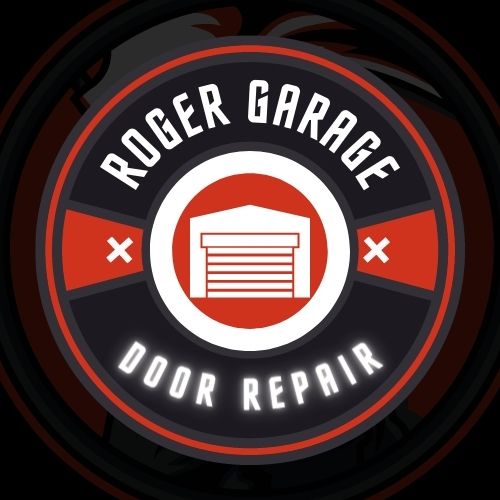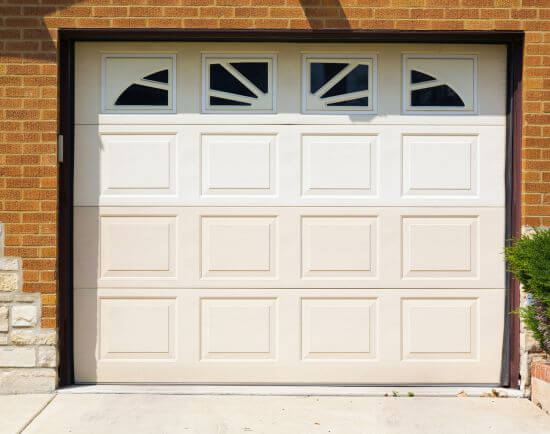Introduction
Is your garage door refusing to budge? With about 63% of American homes having a garage or carport, it’s a problem many people face. This guide delves into the different reasons why your garage door may need repair, unraveling common and complex issues alike.
Keep reading; understanding these problems will take you one step closer to a functioning garage door!
Key Takeaways
- Dead transmitter batteries, misaligned photo eyes, improperly aligned tracks, and mechanical problems with springs or cables are common reasons for garage door repair.
- Regular maintenance such as cleaning the photo eye sensors and lubricating garage door rollers can help prevent issues that require repair.
- It is important to address broken springs promptly to ensure safety and functionality of your garage door.
- Garage door limit settings should be regularly inspected and adjusted to prevent unnecessary wear and tear on the system.
- Professional assistance may be required for issues like enabled disconnect switches or manually locked doors.
- Lubricating garage door rollers with appropriate lubricants helps ensure smooth operation and prevents costly repairs.
- Replacing worn – out or damaged rollers improves functionality and longevity of the garage door. Upgrading to nylon roller replacements reduces noise levels significantly.
- Problems with the garage door opener can occur if the motor is unplugged or if there is a disrupted power supply.
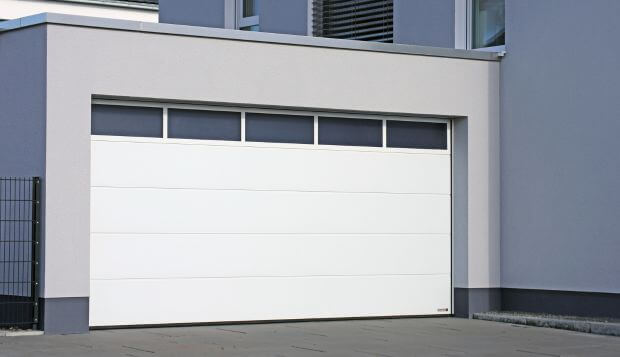
Common Garage Door Issues
Garage door issues commonly include dead transmitter batteries, misaligned photo eyes, improperly aligned tracks, transmitter problems, and obstructions in the door’s path.
Dead Transmitter Batteries
A common issue that can cause garage door malfunctions is dead transmitter batteries. The battery-powered transmitter sends a signal to your garage door to instruct it to open or close.
However, when the batteries die, the transmitter’s signal cannot reach your garage door, preventing it from either opening or closing as commanded. This problem tends to sneak up on many homeowners who often don’t realize their transmitters require regular battery replacements.
It’s an easy fix by sliding open the back of the transmitter and replacing the dead batteries with new ones. To preempt future failures, consider changing all other transmitters’ batteries at once if one shows signs of depletion – this simple routine check can save you a lot of inconvenience down the line.
Misaligned Photo Eye
A common but often overlooked cause of garage door issues is the misaligned photo eye. Photo eyes are safety instruments situated on either side of your door, emitting a beam that detects if there’s anything in the path of a closing garage door.
If these become misaligned or obstructed, it prevents the door from closing properly — all an essential part of ensuring residential garage door safety. Regular cleaning can keep your photo eye sensor free from dirt and grime that could interfere with its operation.
Aligning these sensors requires precision; a task best left to professional garage door service professionals to ensure optimal performance and compliance with safety standards. Problems resulting from dead transmitter batteries or obstructed paths can also be remedied by skilled technicians well-versed in troubleshooting garage door problems while maintaining the highest level of safety precautions.
Improperly Aligned Track
One of the most common garage door problems is a misaligned track. This issue occurs when the metal rail that guides your garage door up and down becomes skewed or distorted, making it troublesome for the garage door to run smoothly.
It’s like driving on a bumpy road with countless potholes – gears grind, springs squeal, and nothing works as it should.
This improper alignment can be caused by various factors such as sudden impacts or standard wear and tear over time. The problem may seem inconsequential at first but if left unrepaired, misaligned tracks pose significant safety risks.
They also put excessive strain on other parts of your garage door system including the motor and cables which may lead to more costly repairs in the future. Therefore, quick action is essential once you notice something amiss with your residential or commercial garage doors’ track alignment.
Employing simple techniques like loosening screws or tapping gently with a rubber mallet could serve as temporary fixes but for longer-term peace of mind consider hiring professional garage door service technicians who specialize in dealing with track misalignment issues efficiently and effectively.
In severe cases where realignment isn’t possible anymore due to excessive damage to tracks, replacement by an experienced technician might be necessary; saving both valuable time and resources while ensuring optimal performance of your automatic garage doors.
Transmitter Problems
Transmitter problems can often be the cause of garage door repair issues. When the transmitter batteries are dead, it prevents the signal from being sent to open the garage door. It’s important to note that if one transmitter needs a new battery, it’s likely that others will need replacement soon as well.
To replace the batteries, simply slide open the door on the back of the transmitter or use a screwdriver to open it. By keeping an eye on transmitter functionality and ensuring fresh batteries are always in place, you can avoid potential headaches with your garage door operation.
Obstructions in the Door’s Path
Obstructions in the door’s path can be a common reason for garage door repairs. These obstructions can disrupt the smooth operation of your garage door and prevent it from closing properly.
It can range from something as innocuous as a small object like a tennis ball or paper blocking the sensors to more serious issues like insect nests or debris on the tracks. These obstacles can interfere with the photo eye sensors or knock the door off its track, causing it to malfunction.
Regularly checking and clearing any obstructions in your garage door’s path is essential for maintaining its functionality and safety.
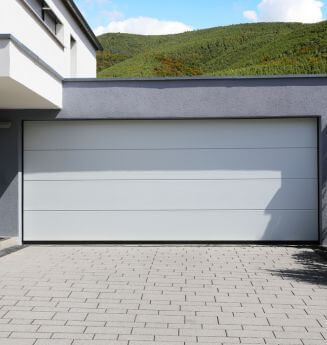
Mechanical Problems Leading to Garage Door Repair
Mechanical problems often require garage door repair, such as broken springs, incorrect limit settings, enabled disconnect switches, manually locked doors, and broken tension springs or cables.
Broken Springs
Broken springs are one of the most common mechanical problems that require garage door repair. Garage door springs play a crucial role in counterbalancing the weight of the door and ensuring smooth operation.
When these springs break, it can cause your garage door to become heavy and difficult to open manually or through an automatic opener. The sudden snapping or breaking of springs can also be dangerous, as it may result in parts of the garage door falling unexpectedly.
It’s important to address broken springs promptly by contacting a professional garage door service provider who can safely replace them with new ones. This will not only restore your garage door’s functionality but also ensure safety for you and your family.
Incorrect Garage Door Limit Settings
When the garage door limit settings are incorrect, it can lead to various mechanical problems that may require professional garage door repair. These limit settings control how far the garage door opens and closes, ensuring it stops at the desired positions.
If the limit setting is too high or too low, it can cause the door to either stop before reaching the floor or come crashing down with excessive force. This not only compromises the safety of your garage but also puts additional strain on other components like springs and cables.
Regularly inspecting and adjusting these limit settings can help prevent unnecessary wear and tear on your garage door system.
Enabled Disconnect Switch
An enabled disconnect switch is an often overlooked component of a garage door system that can be associated with mechanical problems requiring repair. This switch allows you to manually operate the garage door without using the motor.
However, when it’s accidentally left in the enabled position, it can lead to issues such as the door not responding to remote commands or malfunctioning sensors. Garage door service professionals are well-versed in identifying and rectifying these problems, ensuring that your garage door operates smoothly and safely.
Manually Locked Door
A common issue that can lead to the need for garage door repair is when the door becomes manually locked. This often happens when someone accidentally engages the manual lock feature on their garage door opener or pulls a cord that disengages the automatic function.
When this occurs, it can be frustrating and inconvenient, as you will not be able to open or close your garage door with ease. It’s important to remember that manually locking your garage door should only be done in certain circumstances, such as during periods of extended absence or for added security.
If you find yourself unable to operate your garage door because it is manually locked, contacting a professional garage door technician is recommended. They have the expertise to quickly identify and resolve this issue for you, ensuring that your garage door operates smoothly once again.
Broken Tension Springs or Cables
Broken tension springs or cables in garage doors are a common issue that requires immediate repair. These components play a crucial role in safely lowering and lifting the door. When these springs or cables break, it can lead to serious mechanical problems and make it difficult to operate the door smoothly.
Additionally, broken tension springs can cause the door to become heavy, making it nearly impossible to open manually. It’s important to address this issue promptly by contacting professional garage door service technicians who specialize in repairing and replacing these essential components.
By doing so, you can ensure that your garage door operates safely and efficiently.
Complications with Garage Door Rollers
Garage door rollers can face complications that require lubrication or replacement.
Need for Lubrication
Lack of lubrication can spell trouble for your garage door rollers. Without proper lubrication, the rollers can become stiff and resistant to movement, causing strain on the garage door system.
This can lead to a host of issues such as jerky or slow door movement, excessive noise, and even damage to other components of the door. Regularly lubricating your garage door rollers with appropriate lubricants like white lithium or silicone not only ensures smooth operation but also helps prevent costly repairs down the line.
Keep those rollers well-lubricated to keep your garage door running smoothly and quietly.
Need for Replacement
Garage door rollers are an essential part of the system, allowing the door to smoothly glide up and down. Over time, these rollers can become worn out or damaged, leading to issues with the operation of your garage door.
If you notice that your garage door is making loud grinding or squeaking noises when opening or closing, it may be a sign that the rollers need to be replaced. Worn-out rollers can also cause difficulties in moving the door smoothly along its tracks, resulting in jerking movements or even getting stuck halfway.
Replacing these rollers is a relatively simple task that can greatly improve the functionality and longevity of your garage door.
Another reason for replacement could be if you have metal rollers without any ball bearings. These types of rollers tend to wear out faster and require more frequent maintenance compared to newer nylon roller models with ball bearings.
Problems with Garage Door Opener
The garage door opener may not work if the motor is unplugged or if there is a disrupted power supply.
Unplugged Motor
An unplugged motor is one of the common reasons why a garage door may not open or close. The motor switch, which controls the operation of the garage door opener, can become inadvertently disconnected, rendering the motor inactive.
This often happens when someone accidentally disconnects the power supply to the motor while performing other tasks in the garage. If your garage door fails to respond when you press the remote or wall-mounted button, it’s worth checking if the motor is properly plugged in before calling for professional help.
By simply reconnecting and ensuring a secure connection, you can swiftly resolve this issue and get your garage door back in working order.
Disrupted Power Supply
A disrupted power supply is a common problem that can cause your garage door opener to malfunction. When the power supply is interrupted, the motor of your garage door opener may not receive the necessary electricity to operate properly.
This can result in the door not opening or closing when you press the remote control or wall switch. It’s important to check if your garage door opener is properly plugged into a functioning electrical outlet and that there are no issues with the circuit breaker or fuse.
In addition, ensure that there are no loose or damaged wires causing the disruption in power. By addressing any disruptions in the power supply, you can restore functionality to your garage door opener and eliminate any inconveniences caused by a non-functioning system.
Necessity for Replacement
If your garage door opener is constantly malfunctioning or not functioning at all, it may be time for a replacement. An old or faulty garage door opener can cause frustration and inconvenience, leaving you unable to access your garage easily.
Additionally, outdated openers may lack the necessary safety features found in newer models. Modern garage door openers come with advanced technology such as rolling code system and infrared sensors that provide enhanced security and prevent unauthorized entry.
Upgrading to a new garage door opener will ensure smoother operation, improved security, and peace of mind knowing that your garage is protected.
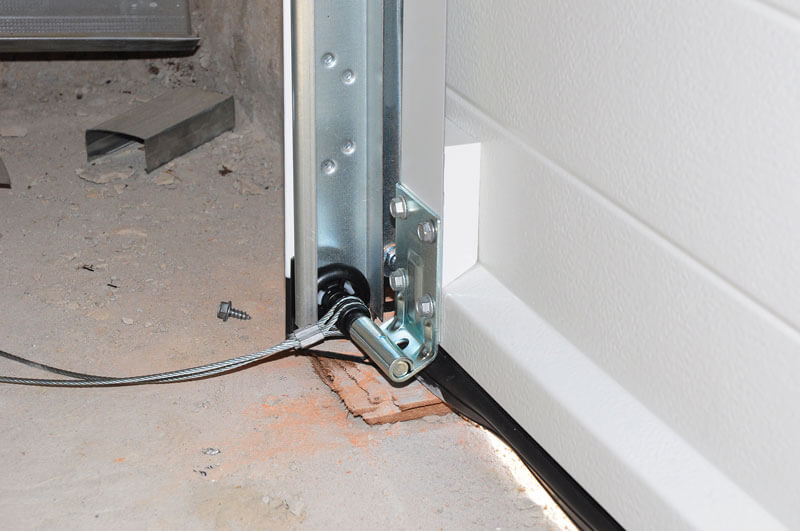
Issues with Garage Door Springs and Cables
Garage door springs and cables can experience issues that require adjustment or replacement for proper functioning.
Need for Adjustment or Replacement
If you notice that your garage door is not functioning properly, it may be due to the need for adjustment or replacement of certain components. Over time, the springs and cables within the garage door system can lose tension or become worn out, resulting in an unbalanced or sluggish door movement.
Additionally, if the set-limit switches are incorrectly adjusted, it can lead to issues with opening and closing. In such cases, it is essential to seek professional assistance from a garage door service provider who can accurately assess whether adjustments or replacements are necessary based on the specific condition of your garage door.
Regular maintenance and timely repairs can help prolong the lifespan of your garage door and ensure its proper functioning for years to come.
Snapped Cable
One common issue that can lead to the need for garage door repair is a snapped cable. Garage door cables are responsible for supporting the weight of the door and ensuring smooth movement.
When a cable snaps, it can cause the door to become unbalanced and potentially fall abruptly, posing a serious safety hazard. This is why it’s crucial to address this problem promptly by contacting professional garage door service technicians who have the expertise and tools to safely replace the damaged cable.
Snapped cables are even more dangerous than broken springs and should never be ignored or attempted to fix without proper knowledge and equipment.
Signs Your Garage Door Needs Repairs
Your garage door may need repairs if you notice slow movement, jerking during closing, the door coming off track, an unbalanced door, or a broken garage door opener.
Slow Door Movement
Slow door movement is a common sign that your garage door is in need of repairs. This issue can be caused by various factors, such as misaligned tracks or worn-out rollers. Over time, the alignment of the door tracks can become compromised, resulting in friction and resistance when opening or closing the door.
Additionally, old or damaged rollers can hinder smooth movement, causing the door to move slowly or even get stuck. Regularly inspecting and maintaining your garage door can help prevent these issues and ensure that it operates efficiently and safely.
Jerking During Closing
If your garage door jerks or jolts while closing, it could be a sign of underlying problems that require immediate attention. This issue is commonly caused by misaligned tracks or worn-out rollers.
Misalignment can occur due to loose screws or bolts, which can cause the tracks to become uneven and disrupt the smooth operation of the door. On the other hand, worn-out rollers can create friction and resistance as the door moves along the track, resulting in jerking motions.
Addressing these issues promptly not only ensures smoother and safer operation but also helps prevent further damage to your garage door system.
Door Coming off Track
One of the most serious and potentially dangerous problems that can occur with a garage door is when it comes off track. This can happen due to a variety of reasons, such as worn-out rollers or an obstruction in the track.
When a garage door comes off track, it not only becomes difficult to open and close but also poses a significant safety risk. A misaligned or off-track garage door may cause damage to property or even injure someone attempting to operate it.
It’s crucial to address this issue promptly by contacting professional garage door service technicians who have the expertise and tools needed to safely realign the door back on track.
Unbalanced Door
An unbalanced garage door can spell trouble for both the functionality and longevity of your door opener. When a garage door is unbalanced, it means that one side is heavier than the other, causing strain on the opener mechanism.
This imbalance can lead to premature wear and tear on the motor and other components, potentially resulting in costly repairs or even complete replacement. The issue may stem from worn-out springs or cables, improper tension settings, or an obstruction along the track.
Not only does an unbalanced door pose a safety risk, but it can also put unnecessary stress on your wallet if left unresolved. Regular maintenance and inspection by a professional are essential for identifying and correcting any balance issues before they escalate into more severe problems.
Broken Garage Door Opener
A broken garage door opener is one of the most common reasons for garage door repair. If your garage door opener is malfunctioning, it can cause the door to not open or close properly, leaving you frustrated and inconvenienced.
There are several signs that indicate a broken opener, such as the motor running but the door not moving, unresponsive remote control or keypad, or unusual grinding noises coming from the opener.
In many cases, a broken opener can be repaired by replacing worn-out parts or adjusting settings. However, in some instances, a complete replacement may be necessary to ensure smooth and reliable operation of your garage door.
Conclusion
In conclusion, there are several common reasons why garage doors may require repair. Issues such as dead transmitter batteries, misaligned photo eyes, improperly aligned tracks, and mechanical problems with the springs or cables can all lead to the need for professional assistance.
Additionally, complications with garage door rollers and problems with the opener itself can also cause issues. It’s important to be aware of these potential problems and seek help from a qualified garage door service professional when necessary to ensure the safety and functionality of your garage door.
FAQs
1. What are some common reasons for garage door repair?
Common reasons for garage door repair include broken springs, damaged panels, malfunctioning sensors, and worn-out cables or rollers.
2. How can I tell if my garage door needs to be repaired?
Signs that your garage door may need repairs include slow or jerky movement, strange noises during operation, difficulty opening or closing the door, and visible damage to the panels or hardware.
3. Can I attempt to fix my garage door myself?
While some minor repairs like replacing a sensor or lubricating moving parts can be done by homeowners with basic knowledge and tools, it is generally recommended to hire a professional for more complex repairs due to safety concerns and the risk of further damaging the door or components.
4. How often should I have my garage door inspected for potential issues?
It is recommended to have your garage door inspected at least once a year by a professional technician to catch any small issues before they become major problems. Regular maintenance can help extend the lifespan of your garage door system and prevent costly repairs in the future.
